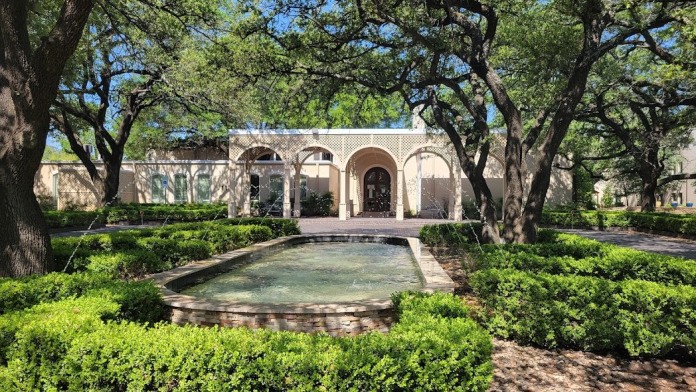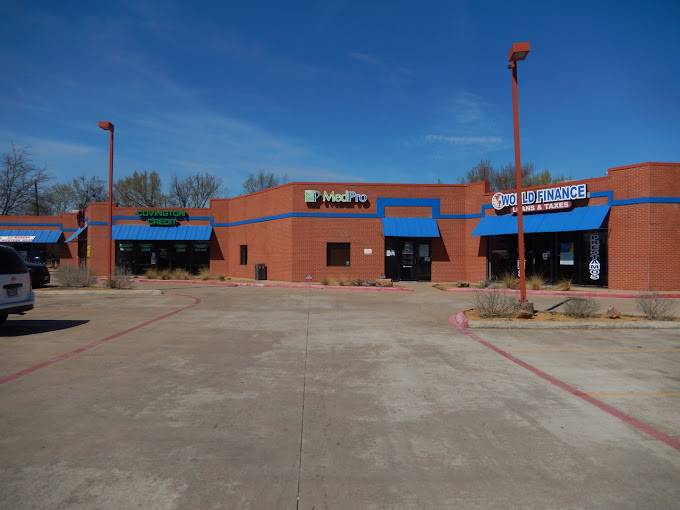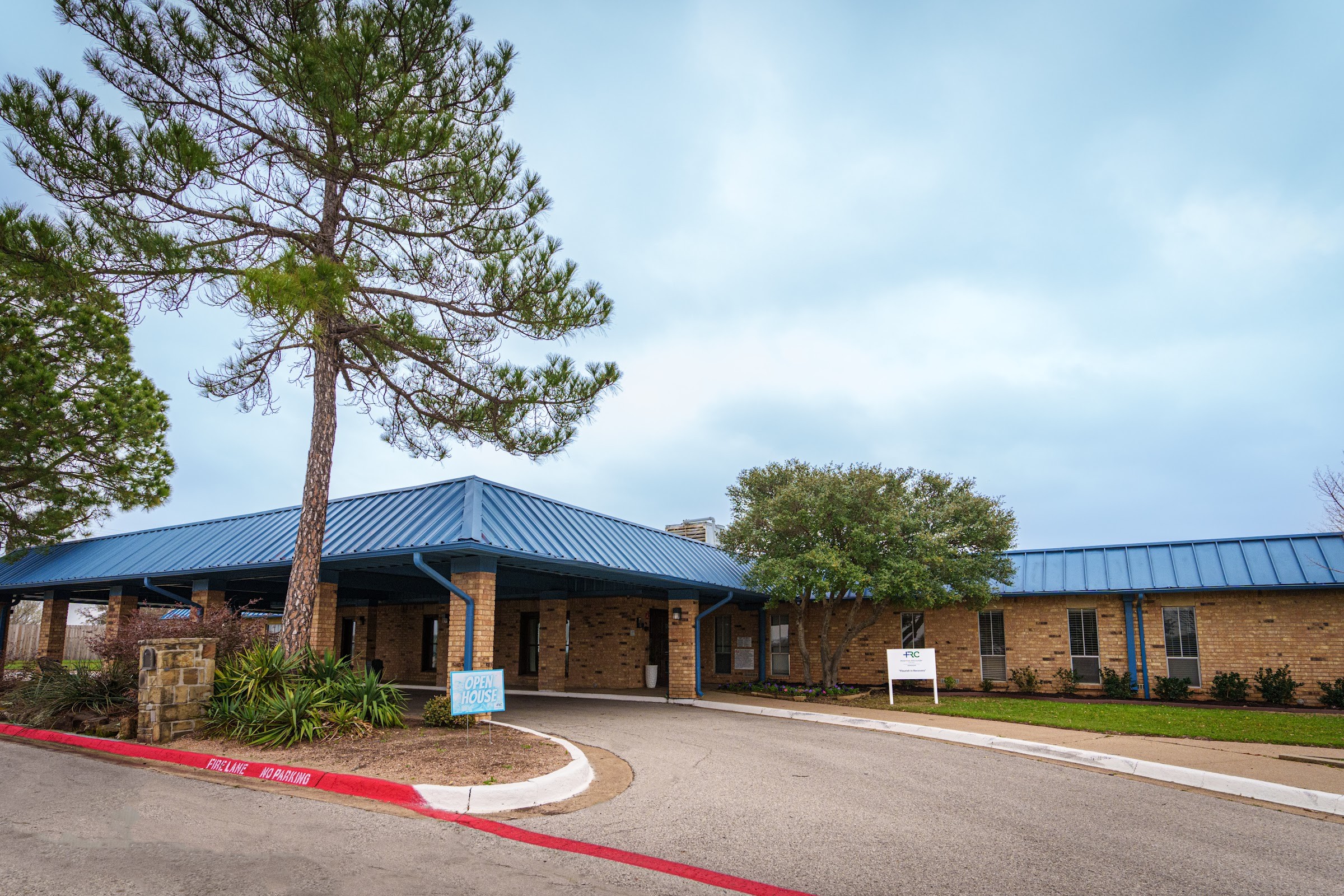A lot of deception, kept lying to me and my parents. They miss advertise what they have on their website. Staff is very rude and crosses the line a lot, to many rules felt like a prison. The IOP sessions are a joke, stuck living in the past and couldn’t move on. Overprice ...
About Chapter House Sober Living
They use a 12 Step approach and have staff on hand 24 hours. The home is 5700 square feet on a golf course in a private neighborhood, and it also has a pool.
The home fills a need between the low structure of a traditional sober living environment and full inpatient or residential treatment. They can help you with your unique needs. This can include any dual diagnosis with a joint mental disorder.
There’s a medical doctor, therapists, and a psychiatrist to help you understand how your diagnosis affects your recovery. There’s also medication management.
The program is also unique in that you and the other guys have a daily schedule that includes 12 Step activities, exercise, meditation, and cleaning. They also offer education and career help through their full-time career coach.
As a resident, you’ll take all the modules in Dave Ramsey’s Financial Peace University. They may take some insurance, but you’ll need to inquire first. So check ’em out to make sure they’re a good fit for you.
At least one parent of a former client has nothing but praise for the program and the staff. He said it was the most stable he’d seen his son in a long time.
Latest Reviews
Rehab Score
Gallery
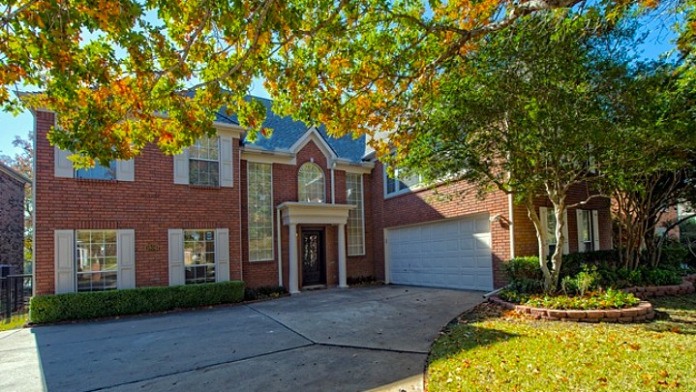
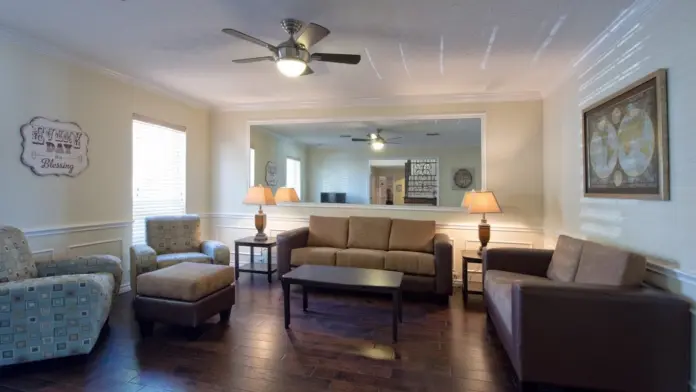
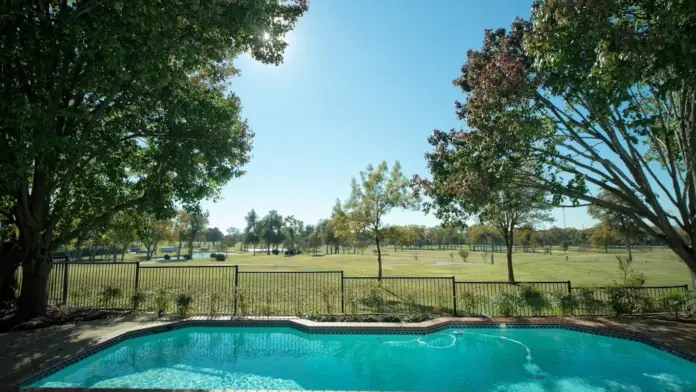
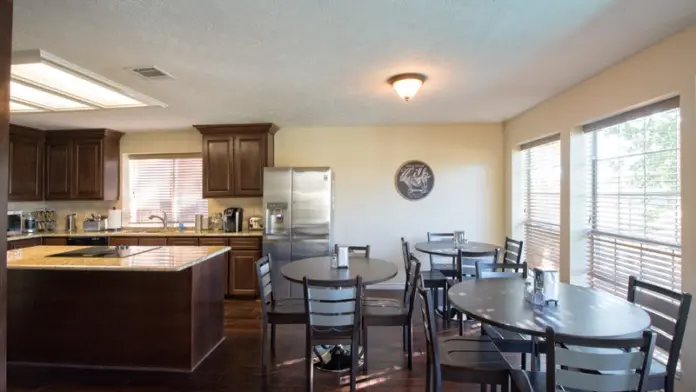
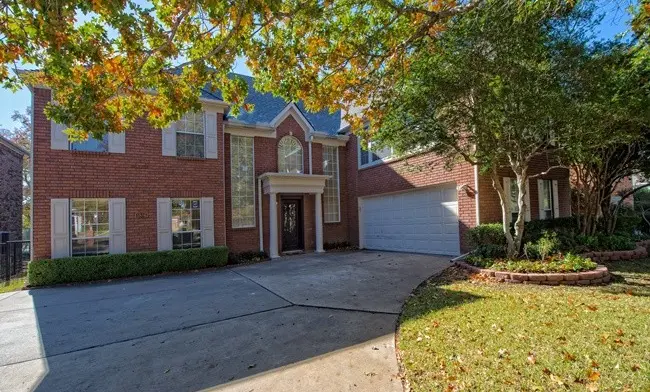
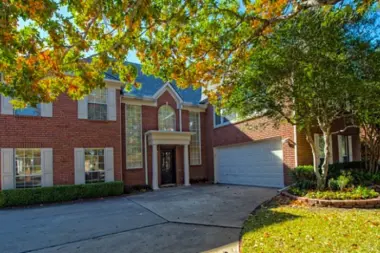
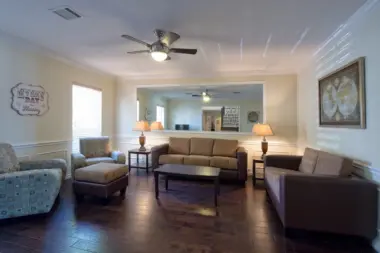
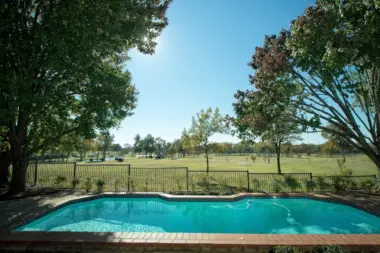
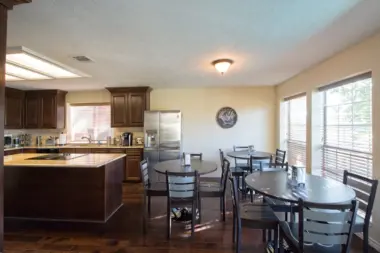
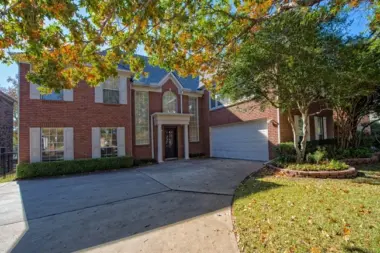
Accepted Insurance
Other Forms of Payment
Private insurance refers to any kind of healthcare coverage that isn't from the state or federal government. This includes individual and family plans offered by an employer or purchased from the Insurance Marketplace. Every plan will have different requirements and out of pocket costs so be sure to get the full details before you start treatment.
Self-pay involves paying for treatment out of your own pocket. You can use savings or credit, get a personal loan, or receive help from family and friends to fund your treatment. If you don't have insurance or your insurance plan doesn't cover a specific program, self-pay can help ensure you still get the care you need.
Private insurance refers to any kind of healthcare coverage that isn't from the state or federal government. This includes individual and family plans offered by an employer or purchased from the Insurance Marketplace. Every plan will have different requirements and out of pocket costs so be sure to get the full details before you start treatment.
Addiction Treatments
Levels of Care
Outpatient Programs (OP) are for those seeking mental rehab or drug rehab, but who also stay at home every night. The main difference between outpatient treatment (OP) and intensive outpatient treatment (IOP) lies in the amount of hours the patient spends at the facility. Most of the time an outpatient program is designed for someone who has completed an inpatient stay and is looking to continue their growth in recovery. Outpatient is not meant to be the starting point, it is commonly referred to as aftercare.
Inpatient rehab programs are geared toward clients in early recovery. They also provide intensive support for clients in crisis and those at an increased relapse risk. Clients receive housing and meals while in inpatient care, allowing them to focus solely on their recovery. Most programs prioritize addiction counseling but may draw on various psychotherapeutic modalities, including CBT, DBT, RBT, trauma therapy, and motivational interviewing. Life skills training and holistic therapies are also common in inpatient care.
Chapter House partners with Chapter House Counseling Center, an advanced recovery intensive outpatient counseling center. They believe good clinical services are essential to the transition into lasting sobriety. Even after the intensity of residential treatment, individuals need space to continue to explore core issues that impact their relationships, recovery and ability to move into adulthood. Chapter House Counseling Center has designed its program specifically for individuals that have been through treatment, had sobriety in the past, or have had exposure to the 12-steps, and need to build on the experiences they’ve had and information they have already been taught.
Rehab aftercare programs are based on a model of continuing care and the premise that recovery is a life-long process requiring ongoing client support. Many rehab aftercare services include outpatient care, but clients often continue to receive support after being discharged from formal treatment. Case managers and care teams typically collaborate with clients to design their long-term care plan, which may include peer coaching, career counseling, and 12 step program induction, among other services.
All clinical services are integrated with 12-step principles and an understanding of the importance of applying the steps into every area of our emotional life, spiritual life, professional life, and family life. 12-step programs are addiction recovery models based on Alcoholics Anonymous (AA). Beginning steps involve admitting powerlessness over the addiction and creating a spiritual basis for recovery. Middle steps including making direct amends to those who've been hurt by the addiction, and the final step is to assist others in addiction recovery in the same way.
Sober Living Houses (SLHs), aka sober homes or halfway houses, are safe, substance-free, supportive living facilities for those recovering from substance abuse. Ideal for those who've just been through inpatient or outpatient treatment, SLHs are supervised environments with rules that support sobriety, such as curfews, shared chores, and therapeutic meetings. Residents are also often trained on life skills and coping skills to make it easier to transition into society. SLHs also provide a strong sense of community that can lead to the kind of deep and lasting connections with other sober individuals that supports a new, healthy lifestyle.
A drug intervention in Texas may be necessary if your loved one is in denial about a substance use disorder. You can partner with intervention services to plan and execute an effective intervention that educates your loved one about addiction and encourages them to get the treatment they need. Many rehab centers offer intervention specialists who can facilitate the intervention and help with a seamless transition to inpatient rehab for treatment.
Most sober living environments have very little staff and are often limited to a live-in house manager. While this approach works well for many, they believe this leaves gaps in the supervision of residents who are in a vulnerable transition. Chapter House provides 24-hour awake staff. A staff member is always on property to ensure supervision, safety, cleanliness, program compliance, and leadership.
Treatments
The goal of treatment for alcoholism is abstinence. Those with poor social support, poor motivation, or psychiatric disorders tend to relapse within a few years of treatment. For these people, success is measured by longer periods of abstinence, reduced use of alcohol, better health, and improved social functioning. Recovery and Maintenance are usually based on 12 step programs and AA meetings.
During rehab in Texas, you'll deal with underlying issues that contribute to addiction. By addressing these challenges and learning healthy ways to cope with them, you'll develop strategies that help you live a drug-free lifestyle.
At Chapter House they realize that young men in early sobriety are dealing with numerous issues above and beyond chemical dependency. Chapter House Counseling Center is fully equipped to deal with clients with dual diagnosis, including but not limited to, depression, anxiety, OCD, bipolar, and PTSD. In addition, they have the resources to work with individuals with co-occurring disorders such as sex addiction, eating disorders and gambling addictions. Chapter House Counseling Center has an onsite staff psychiatrist and medical director who will provide a psychiatric evaluation on each client as well as ongoing psychiatric management.
Opioid rehabs specialize in supporting those recovering from opioid addiction. They treat those suffering from addiction to illegal opioids like heroin, as well as prescription drugs like oxycodone. These centers typically combine both physical as well as mental and emotional support to help stop addiction. Physical support often includes medical detox and subsequent medical support (including medication), and mental support includes in-depth therapy to address the underlying causes of addiction.
Substance rehabs focus on helping individuals recover from substance abuse, including alcohol and drug addiction (both illegal and prescription drugs). They often include the opportunity to engage in both individual as well as group therapy.
Programs
Adult rehab programs include therapies tailored to each client's specific needs, goals, and recovery progress. They are tailored to the specific challenges adult clients may face, including family and work pressures and commitments. From inpatient and residential treatment to various levels of outpatient services, there are many options available. Some facilities also help adults work through co-occurring conditions, like anxiety, that can accompany addiction.
Young adulthood can be an exciting, yet difficult, time of transition. Individuals in their late teens to mid-20s face unique stressors related to school, jobs, families, and social circles, which can lead to a rise in substance use. Rehab centers with dedicated young adult programs will include activities and amenities that cater to this age group, with an emphasis on specialized counseling, peer socialization, and ongoing aftercare.
Men face specific challenges and concerns when seeking addiction treatment. Gender-specific recovery programs help them tackle these issues head-on in an environment that's focused, targeted, and distraction-free. It also gives them the opportunity to connect with and learn from other men who have been through a similar journey and can offer support for the next step.
Clinical Services
The goal of cognitive behavioral therapy (CBT) in Texas is to change thought patterns, which leads to changes in behavior. Specific techniques during CBT can include self talk, SMART goals, journaling, and positive activities.
Group therapy is any therapeutic work that happens in a group (not one-on-one). There are a number of different group therapy modalities, including support groups, experiential therapy, psycho-education, and more. Group therapy involves treatment as well as processing interaction between group members.
In individual therapy, a patient meets one-on-one with a trained psychologist or counselor. Therapy is a pivotal part of effective substance abuse treatment, as it often covers root causes of addiction, including challenges faced by the patient in their social, family, and work/school life.
Motivational Interviewing (MI) is a clinical approach to helping people with substance abuse issues and other conditions shift behavior in positive ways. It is more goal-oriented than traditional psychotherapy, as MI counselors directly attempt to get clients to consider making behavioral change (rather than wait for them to come to conclusions themselves). Its primary purpose is to resolve ambivalence and help clients become able to make healthy choices freely.
Trauma therapy addresses traumatic incidents from a client's past that are likely affecting their present-day experience. Trauma is often one of the primary triggers and potential causes of addiction, and can stem from child sexual abuse, domestic violence, having a parent with a mental illness, losing one or both parents at a young age, teenage or adult sexual assault, or any number of other factors. The purpose of trauma therapy is to allow a patient to process trauma and move through and past it, with the help of trained and compassionate mental health professionals.
Whether a marriage or other committed relationship, an intimate partnership is one of the most important aspects of a person's life. Drug and alcohol addiction affects both members of a couple in deep and meaningful ways, as does rehab and recovery. Couples therapy and other couples-focused treatment programs are significant parts of exploring triggers of addiction, as well as learning how to build healthy patterns to support ongoing sobriety.
When applicable, the families of their residents will be afforded the opportunity to be involved at every level of the Chapter House program. Their staff is passionate about mentoring family members and giving them individual support through the recovery of their loved ones. A family workshop will be facilitated once a month for all past and current families to join together for a staff led presentation, family discussion and fellowship among families at various stages of the recovery experience.
The Chapter House life development curriculum focuses on relationships, goal setting, cooking, cleaning, organization, professional skills, hygiene and budgeting. Each resident will be required to go through Dave Ramsey’s Financial Peace curriculum for young adults. They believe the curriculum is invaluable in its teaching of living debt free, learning to be disciplined with money, save, give, and ultimately to have financial freedom.
What you eat has a significant effect on your mental and physical health. That's why many addiction recovery programs in Texas incorporate nutrition therapy in their treatment. This therapy teaches you how addiction affects nutrition, what foods are best to eat during recovery, and how to shop for and prepare healthy meals.
Addiction recovery treatment in Texas will offer recreational therapy in a holistic approach to treatment. Therapy incorporates enjoyable activities that support your physical and mental health, such as team sports, creative arts, or individual sports. This activity gives you an emotional outlet, reduces your stress, and improves your mood, each of which promotes long term sobriety.
Amenities
-
Yoga Studio
-
Residential Setting
-
Swimming Pool
-
Recreation Room
-
Private Setting
Staff & Accreditations
Staff

Heidi Voet, LPC-S
Owner & Clinical Director
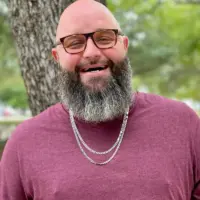
William Byrum
Director of Operations
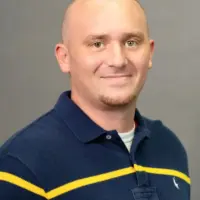
Marty Younkman
Operations Manager

Temor Tucker
Lead Case Manager

Boyd Roberts
Resident House Manager
Accreditations

The Commission on Accreditation of Rehabilitation Facilities (CARF) is a non-profit organization that specifically accredits rehab organizations. Founded in 1966, CARF's, mission is to help service providers like rehab facilities maintain high standards of care.
CARF Accreditation: Yes
Accreditation Number: 285394

LegitScript has reviewed Chapter House Sober Living as part of their certification program, and has determined that it meets the LegitScript standards for legality, safety and transparency.
LegitScript verified in November 2019

The National Association of Addiction Treatment Providers (NAATP) is a professional association that represents organizations in the field of addiction services. Founded in 1978, NAATP's mission is to advance addiction services and ensure that high-quality addiction treatment is available and accessible.
NAATP Member: Yes
Contact Information
1806 Weanne Drive
Richardson, TX 75082






